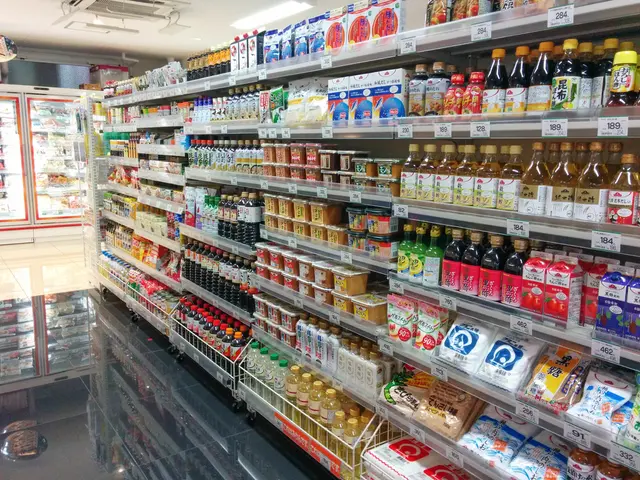Consuming Sweetened Beverages Linked to Increased Risk of Developing Type 2 Diabetes
A recent meta-study, led by researchers from Brigham Young University in Provo, Utah, has shed new light on the relationship between dietary sugar and the risk of developing type 2 diabetes. Contrary to popular belief, the study suggests that the source of sugar consumption significantly impacts one's risk of Type 2 diabetes.
While the consumption of sugar in sweetened beverages, such as sodas, energy drinks, and even 100% fruit juice, is found to increase the risk of Type 2 diabetes, the study shows that eating sugar in solid foods, like desserts, snacks, or other foods containing sucrose or total sugars, does not have the same harmful effects.
In fact, the researchers discovered that an intake of 20 grams of sugars per day may have a slight protective effect against the development of Type 2 diabetes. This finding challenges the notion that all sugar intake is inherently harmful and emphasizes the importance of considering the food matrix and how different forms of sugar are metabolized in the body.
The study, published in the journal "Advances in Nutrition," analyzed the findings of 29 studies conducted across Europe, the United States, Asia, Australia, and Latin America. The researchers found a significant association between sugar-sweetened beverages and the development of Type 2 diabetes, with each additional 12-ounce serving per day increasing the risk by about 25%. Fruit juice was also found to slightly increase the risk, with each additional 8-ounce serving associated with a 5% higher risk.
In contrast, the moderate intake of sugars in solid foods did not show any harmful effects and may even have a beneficial impact on Type 2 diabetes risk.
Lead author Karen Della Corte, PhD, Assistant Professor of Nutrition, Dietetics, and Food Science at Brigham Young University, commented that their findings reinforce the idea that carbohydrates, including sugars, are an important part of the diet. However, the way they are consumed really matters, she added.
The difference between drinking versus eating sugars lies in the way they are metabolized in the body. When sugar is dissolved in liquid and consumed in beverages, it floods the system quickly, overwhelming the body's ability to process it in a healthy way. On the other hand, when sugar is consumed in solid foods, it is absorbed more slowly, leading to slower blood sugar spikes and insulin responses.
The study is significant because it challenges the belief that all sugar intake is bad and highlights the importance of considering overall diet and lifestyle factors when evaluating the impact of sugar on Type 2 diabetes risk. By focusing on carbohydrate quality, rather than simply cutting out sugar completely, individuals may be able to make more informed choices about their diet and reduce their risk of developing Type 2 diabetes.
- The meta-study, led by Brigham Young University researchers, has emphasized the importance of considering the food matrix in relation to diabetes risk.
- The source of sugar consumption significantly impacts the risk of Type 2 diabetes, challenging popular beliefs.
- While sweetened beverages increase the risk of Type 2 diabetes, consuming sugar in solid foods does not have the same harmful effects.
- An intake of 20 grams of sugars per day may even have a slight protective effect against Type 2 diabetes.
- The study, published in "Advances in Nutrition," analyzed 29 studies across multiple continents.
- Each additional 12-ounce serving of sugar-sweetened beverages per day increases the risk of Type 2 diabetes by about 25%.
- Fruit juice also slightly increases the risk, with each additional 8-ounce serving associated with a 5% higher risk.
- Moderate intake of sugars in solid foods does not show any harmful effects and may have beneficial impacts.
- Lead author Karen Della Corte noted that carbohydrates, including sugars, are an important part of the diet.
- The way sugars are consumed matters significantly, as revealed by the study.
- Liquid sugar floods the system rapidly, making it difficult for the body to process healthily.
- Solid food sugar, on the other hand, is absorbed more slowly, leading to slower blood sugar spikes and insulin responses.
- The study underscores the need to consider overall diet and lifestyle factors when evaluating Type 2 diabetes risk.
- Focusing on carbohydrate quality, rather than simply cutting out sugar, can help individuals make informed dietary choices.
- The study reinforces the role of nutrition science in understanding chronic diseases like Type 2 diabetes.
- The findings have implications for workplace-wellness programs and medical-conditions management.
- Nutrition plays a crucial role in managing Type 2 diabetes risk, alongside other chronic diseases like cancer and respiratory conditions.
- Digestive health, eye-health, hearing, and skin-care are all aspects of health and wellness that are influenced by nutrition.
- Fitness and exercise, mental health, and autoimmune disorders can also be impacted by diet.
- Therapies and treatments for medical conditions often involve dietary modifications.
- Weight management and cardiovascular health are key areas where dietary changes can make a significant difference.
- Medicare and finance are critical considerations when implementing lifestyle changes related to nutrition.
- CBD, a popular substance in health and wellness, is often marketed as a remedy for various health conditions.
- Maintaining a balanced diet and an active lifestyle is crucial for overall health and wellness.
- Lifestyle choices, such as nutrition, fitness, and mental health management, are important for managing wealth and personal finance.
- Healthy cooking, sustainable living, budgeting, and technology can all play a role in promoting a healthy lifestyle.
- Relationships, pets, and hobbies like gardening, outdoor living, fashion, cooking, and baking are parts of a holistic lifestyle approach.
- Deals and discounts on health and wellness products can make it easier to maintain a healthy lifestyle.
- Shopping for nutritious ingredients, exploring global cuisines, and practicing data and cloud computing skills can support a healthy and efficient lifestyle.







